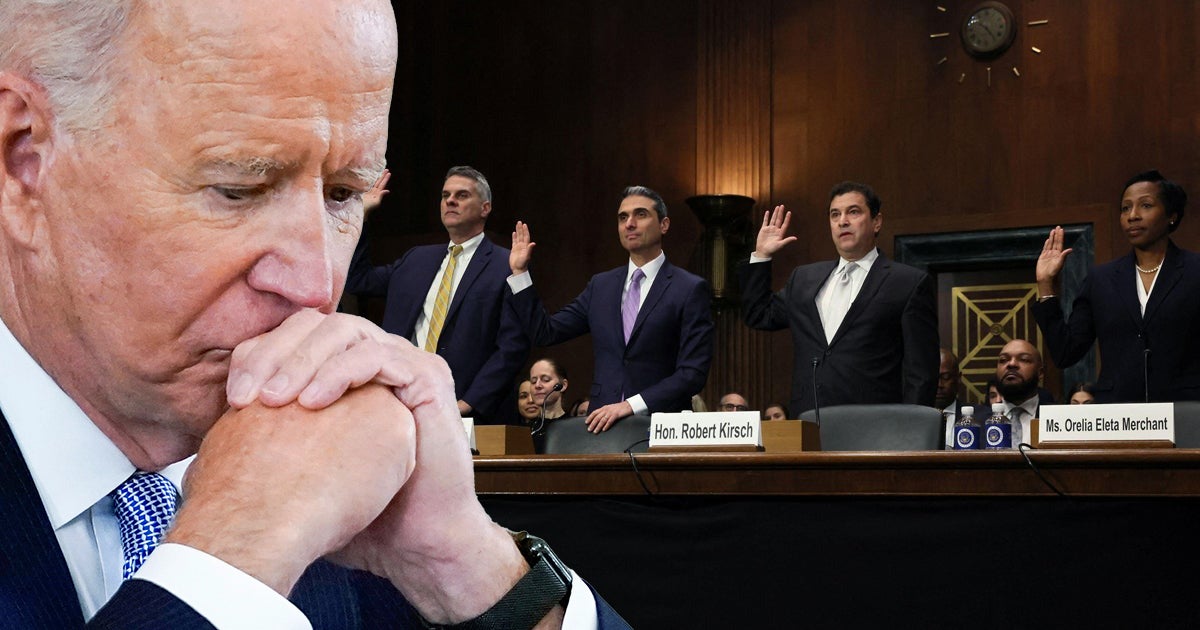
by Jorge Gomez • 6 min read
President Biden continues to outpace every president since George W. Bush on federal judges. The Senate has now confirmed more than 115 of his nominees. However, this rapid pace of confirmations could be slowing down.
NBC News reports the absence of two senators has caused some delays in recent weeks:
“The Judiciary Committee, which advances nominees for full Senate confirmation, is hindered by a pivotal Democratic absence. Sen. Dianne Feinstein of California was hospitalized ‘with a case of the shingles,’ prompting the committee to delay a scheduled Thursday meeting to advance judicial nominees; she said she hopes to return to Washington ‘later this month.’ And the absence of Sen. John Fetterman of Pennsylvania, who is getting help for clinical depression, forced Vice President Kamala Harris to break ties.”
There’s also been discussion about the Senate’s “blue slip” tradition. Though not a formal rule, this custom requires district court nominees to have the support of their home state senators. It allows the two senators to submit a blue slip and sign off on a prospective judge, or withhold the slip, essentially vetoing the nomination.
In his first two years, most of Biden’s circuit and district court appointments have been nominees in blue states, or those represented by two Senate Democrats, who narrowly control the chamber. But as Bloomberg Law reports, “the majority of current future district court vacancies without a pending nominee are in states with two Republican senators.”
This means the President and his party may have to do a bit more work when vetting nominees and getting them through the confirmation process. They’ll have to get support of their colleagues on the other side of the aisle if they want to keep up the rapid pace of confirmations.
Liberal groups have let out a collective groan, saying the minority power could “abuse” the blue slip custom to halt Biden’s nominees and stall the pace of confirmations. On cue, the liberal-leaning New York Times published an editorial titled “How to Stop a Senator from Blocking a Federal Judge.” They argued the blue slip tradition is “a fundamentally undemocratic practice that gives far too much power to individual senators,” and said “it’s far past time” for Senate Judiciary Committee Chairman Dick Durbin to “unilaterally” get rid of it.
What’s more, the judiciary committee has no hearings scheduled to consider new judicial nominees this month.
Fewer Vacancies and Controversial Nominees
Biden and his party have brought about some change on the federal bench. But this doesn’t necessarily mean he’s going to have the same impact on the judiciary as his predecessor. He faces an uphill battle if he wants to surpass the more than 230 judges confirmed under the Trump administration.
Biden has about 60 fewer vacancies available at this point—40% less—than Trump. He would need dozens of judges to retire soon if he wants to “reshape” the judiciary.
There could be further slowdowns ahead given the controversial and radical record of several Biden nominees. Many of these selections have drawn staunch opposition. National Review points to a handful, including Charnelle Bjelkengren, who failed to answer basic constitutional questions about what Article II and Article V say.
First Liberty has previously warned about several appellate court picks. While in private practice, some of them worked for—or were endorsed by—some of the most radical groups in the country, which suggests they could be hostile to religious liberty and unconstitutionally advance a liberal policy agenda from the federal bench. The following are pending a confirmation vote before the full Senate:
Many Americans are worried about the quality and judicial philosophy of the judges confirmed under the Biden administration. Sen. Mitch McConnell said recently, “the American people deserve a judiciary that contains the smartest, most formidable, most qualified legal all-stars in the country.” But, he added, so far, the president and his party are “producing… something else.” Slowing down confirmations could bring a sigh of relief for people who respect the Constitution in the face so many radical judicial picks.
Federal judges make critical legal decisions about your religious freedom. First Liberty will continue to monitor judicial nominees. Our team of experts will continue to provide you with the facts if any of them have a radical or unacceptable record.
RELATED NEWS
U.S. Senate Confirms Three More Biden Judicial Picks as Momentum Slows
Reuters reports: The U.S. Senate recently signed off on three more of President Joe Biden’s judicial nominees, even as the Democrats’ push to reshape the federal judiciary has shown signs of slowing following the confirmation of more than 100 judges. The latest nominee to win the Democratic-controlled Senate’s approval was Arun Subramanian, a litigator at the law firm Susman Godfrey, with a 59-37 vote. He is set to become a judge on Manhattan’s federal court.
Senator Committee Absence Again Stalls Court Nominee Votes
Bloomberg Law reports: The Senate Judiciary Committee again delayed consideration of a nominee for a federal district judgeship in Washington state, as the Democratic-led panel continues to lack a tie-breaking vote. Charnelle Bjelkengren was poised for a vote after she was held over from the Feb. 16 markup. Democrats canceled the subsequent March 2 meeting amid Sen. Dianne Feinstein’s (D-Calif.) absence for treatment of shingles. She expects to make a return later this month, Feinstein’s press secretary Adam Russell told Bloomberg Law.
Liberal Groups Raise ‘Grave Concerns’ About Biden Judicial Pick
Politico reports: Several liberal advocacy organizations are expressing serious doubts about President Joe Biden’s nominee to the First Circuit Court of Appeals, highlighting his handling of a school sexual assault case. In a memo sent to the Judiciary Committee, the Leadership Conference on Civil and Human Rights, People for the American Way and other liberal groups expressed “grave concerns” about Michael Delaney’s nomination.